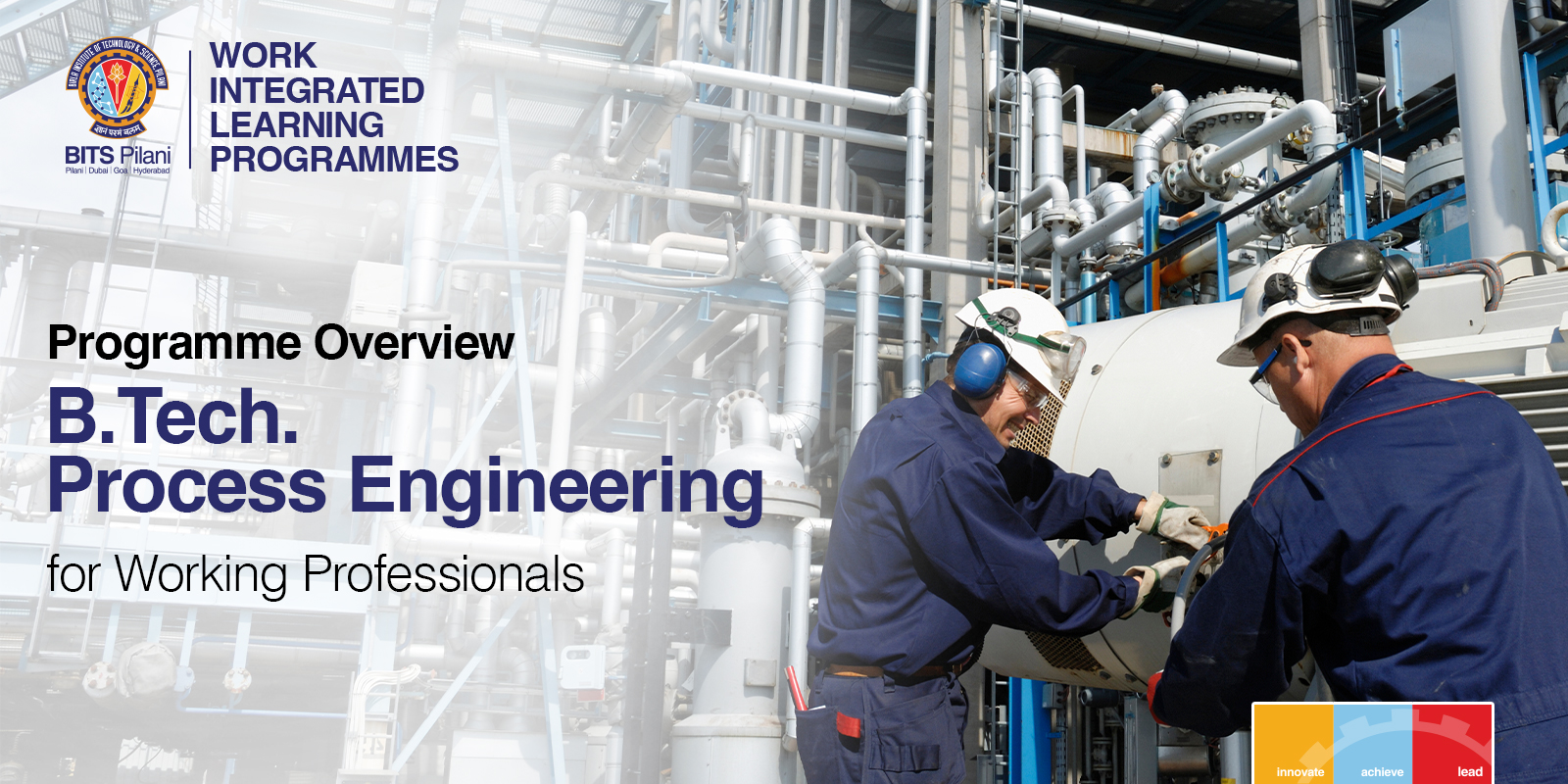B.Tech. Process Engineering
Process Engineering is a branch of Chemical Engineering that focuses on the design, operation, control, and optimisation of chemical, physical and biological processes.
BITS Pilani offers a seven-semester Work Integrated Learning Programme designed for working professionals who are engaged in day-to-day activities related to Process Engineering. This programme aims to enhance knowledge and provides a broader vision of all the important aspects of Process Engineering.
Option to pay fees using an easy EMI option is available with 0% interest
Programme Highlights
- Industry-relevant curriculum, delivered online or on-site lectures.
- The Dissertation (Project Work) in the final semester enables students to apply concepts and techniques learnt during the programme.
- The programme uses a Continuous Evaluation System that assesses the learners over convenient and regular intervals. Such a system provides timely and frequent feedback and helps busy working professionals stay on course with the programme.
- The education delivery methodology is a blend of classroom and experiential learning. Experiential learning consists of lab exercises, assignments, case studies and work-integrated activities.
- Participants who successfully complete the programme will become members of an elite & global community of BITS Pilani Alumni.
Programme Curriculum
Participants need to take at least 12 courses towards coursework, and complete one Project/ Dissertation. The coursework requirement for the programme would consist of a set of core courses and electives. Core courses are compulsory for all participants, while electives can be chosen based on individual learning preferences.
The programme offers a degree of customisation to address the specific L&D needs of your organisations.
- Electrical & Electronics Technology
- Engineering Materials
- Calculus
- Computer Programming
- Unit Operations – I
- Engineering Measurements
- Linear Algebra & Optimization
- Chemical Process Calculations
- Chemical Engineering Thermodynamics
- Fundamentals of Transport Processes
- Process Design Principles
- Elective 1
- Energy Management
- Process Equipment Design
- Elective 2
- Elective 3
- Process Plant Safety & Environment
- Process Control & Instrumentation
- Elective 4
- Elective 5
- Technical Report Writing
- Principles of Management
- Elective 6
- Elective 7
Dissertation
- Quality Control Assurance & Reliability
- Power Plant Engineering
- Manufacturing Processes
- Production Planning and Control
- Materials Management
- Industrial Engineering
- Pharmaceutical Quality Control & Regulatory Affairs
- Mineral Beneficiation & Agglomeration
- Iron Making
- Advances in Material Science & Testing
- Essentials of Project Management
- Steel Making & Casting
- Unit Operations II
- Corrosion Engineering
- Chemical Reaction Engineering
- Furnace Technology
- Advances in Materials Science
- Environmental Pollution Control
- Extractive Metallurgy
- Fertilizer Technology
- Cement Technology
- Fibre & Cellulosic Technology
- Pharmaceutical Analysis
- Disinfection & Sterilization Processes
Learning Methodology
LECTURES DELIVERED ONLINE AND ONSITE
Lectures are delivered by BITS Pilani faculty members through live via online classes, or at the organisation's premises, and are designed to offer similar levels of interactivity as regular classrooms at the BITS Pilani campus.
DIGITAL LEARNING
Learners can access engaging learning material at their own pace which includes recorded lectures from BITS Pilani faculty members, course handouts and recorded lab content where applicable.
CONTINUOUS ASSESSMENT
Continuous Assessment includes graded Assignments/ Quizzes, Mid-semester exam, and Comprehensive Exam.
EXPERIENTIAL LEARNING
The programme emphasises on Experiential Learning, it allows learners to apply concepts learnt in the classroom in simulated, and real work situations. This is achieved through:
- Simulation based hands-on exercises.
- Case Studies and Assignments: Carefully chosen real-world cases & assignments are both discussed and used as problem-solving exercises during the programme.
- Dissertation/ Project Work: The fourth semester offers an opportunity for learners to apply their knowledge gained during the programme to a real-world like complex project. The learner is expected to demonstrate understanding of vital principles learnt across semesters and their ability to successfully apply these concepts.
Eligibility Criteria
Minimum eligibility to apply: Employed professionals with Technical Diploma/B.Sc. with adequate preparation in Mathematics, with at least 60% aggregate marks and minimum two years of work experience after the completion of the degree in relevant domains.
The programme is designed for professionals with experience in Operations and Maintenance in industries such as Petroleum & Petrochemical, Specialty Chemicals, Mineral Processing, Food, Pharmaceutical and Bioprocess.


.png)
.png)
.png)
.png)
.png)
.png)
.png)
.png)